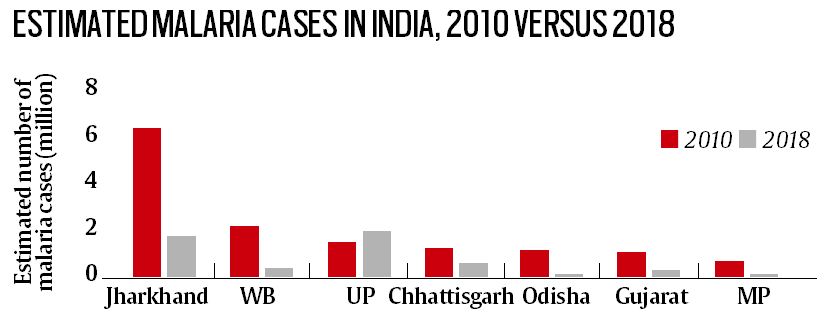Governance
World Malaria Report, 2019
- 05 Dec 2019
- 3 min read
Why in News
The World Health Organisation (WHO) has released the World Malaria Report, 2019.
- The report provides a comprehensive update on global and regional malaria data and trends including prevention, diagnosis, treatment, elimination and surveillance.
- According to the report, 228 million cases of malaria are observed worldwide, down from 251 million cases in 2010.
- Highest Burden: India along with 19 countries in sub-Saharan Africa carried almost 85% of the global malaria burden.
- Though India has observed the largest absolute reductions among the countries that share 85% of the malaria burden.
Key Points
- Global Analysis:
- Incidence rate: It has declined globally between 2010 and 2018, from 71 to 57 cases per 1000 population.
- Deaths: The number of deaths due to malaria has decreased globally. (405,000 deaths in 2018 from 416,000 deaths in 2017).
- National Analysis:
- Incidence rate: India reported 2.6 million fewer cases in 2018 compared to 2017. Thus the overall incidence of malaria in the country has reduced.
- However, 7 states (Uttar Pradesh, Jharkhand, Chhattisgarh, West Bengal, Gujarat, Odisha and Madhya Pradesh) account for about 90% of the burden of malaria cases in India.
- Deaths: Overall number of deaths due to malaria in India have reduced.
- Incidence rate: India reported 2.6 million fewer cases in 2018 compared to 2017. Thus the overall incidence of malaria in the country has reduced.
Steps taken at the global level
- WHO’s Global Technical Strategy for Malaria, 2016-2030.
- WHO has also released a new country-driven approach–“High burden to high impact” to enhance response to malaria in countries where malaria cases increased in 2018 as compared to 2017
Steps taken by the Indian government
- National Strategic Plan for Malaria Elimination (NSPME) (2017-22)
- The Strategic Plan gives year wise elimination targets in various parts of the country depending upon the endemicity of malaria in the next 5 years.
- It is based on the National Framework for Malaria Elimination 2016 which is in line with WHO’s Global Technical Strategy for Malaria, 2016-2030.
- Indian Council of Medical Research (ICMR) has established ‘Malaria Elimination Research Alliance-India (MERA-India) which is a conglomeration of partners working on malaria control.
Malaria
- Malaria is caused by Plasmodium parasites.
- The parasites are spread to people through the bites of infected female Anopheles mosquitoes, called "malaria vectors",
- World Malaria Day is observed on 25th April.
- It can be noted that WHO officially endorses disease-specific global awareness days for only four diseases viz. HIV-AIDS, TB, Malaria, and Hepatitis.





